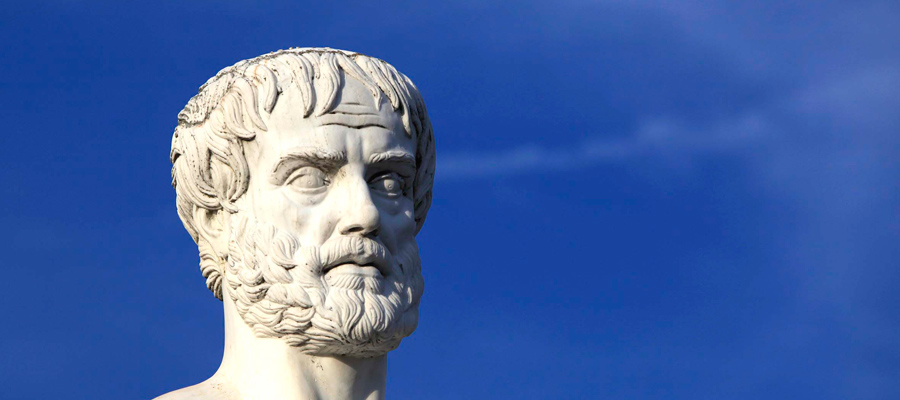Stagirian Aristotle
Stagira was a small city of Halkidiki in the 4th century, which was under the jurisdiction of Macedonia’s Κing. Aristotle, who later became one of the most important Greek philosophers of ancient times, was born there in 384 B.C. Today the region is called Liotopi, and is half kilometer south of Olympiada village. Aristotle came from an important and wealthy family. His father Nicomachus belonged to the genus of Asclepius and historical sources report that he was personal doctor, friend and advisor of Κing Amyntas II, father of Macedonia’s King Philip II. His mother, Faistida, came from Halkida. Aristotle spent his childhood years in Pella, in the Macedonian Royal Court. His parents died when he was still a child so he was raised by a relative and friend of his father named Proxenus.
THE YOUTH YEARS
He stayed there for twenty years (367-347 B.C.) until his master’s passing but there is no clear information during that period. It is said though, that he did not accept all of Plato’s theories easily. There was a period where he had won his favor but later on, when their opinions differentiated, serious differences and probably tension appeared in their relationship. In retrospect, some people -probably friends of Speusippus, Plato’s nephew and heir to the direction of the Academy- accused him of indecent behavior towards the teacher.
THE AFTER PLATO ERA
Thus he accepted the invitation of Hermias, former slave and student of the Academy and at that time tyrant of cities Atarneus and Assos, and went to Troad’s Assos in the Middle East. Hermias had a few of Plato’s followers around him and that was favorable for Aristotle. He stayed in Assos for three years and married Pythias, niece and stepdaughter of Hermias. They had a daughter named after his wife. While in Athens, and after the death of his wife, he became involved with Herpyllis of Stagira who bore him a son named Nicomachus.
When Persians assassinated Hermias for his Macedonian-friendly beliefs, Aristotle, being urged by his most loyal student and partner Theophrastus, left Middle East and settled in Mytilene (345 B.C.) where he stayed for two years. During that time, King Philip II had heard a lot from Hermias about him and searching for a tutor for his son Alexander, who later would grow up to be Alexander the Great, invited him to Pella. Thus, the time between 343-342 B.C., Aristotle was in Macedonia and undertook the education and training of thirteen year old Alexander. Their respectful relationship continued even after Aristotle’s departure. After 340 B.C., when Alexander was appointed viceroy, Aristotle settled in his hometown Stagira.
THE PERIPATETIC SCHOOL
Aristotle stayed in Macedonia until 335/334 B.C., just after Philip’s assassination and Alexanders newly reign. Next he returned to Athens and from that moment on the most fertile period of his life begun. He leased land -because, according to Athenian law, a foreigner had no right of owning any property- between the Lycabettus hill and the river Ilissos in the area near the temple dedicated to Apollo Lyceum and the Muses, and founded an official school, the Lyceum. This school was named “Peripatetic” and its members “Peripatetics” due to the fact that they used to walk around the gardens while discussing. Aristotle, during his time when he was head of The Lyceum (336/335-323/322 B.C.) wrote some important pieces on philosophy, morality, biology and psychology. At the same time he began organizing his research and classifying the sciences.
He also collected hundreds of manuscripts and therefore created the first large organized library, which was a model for those of Alexandria’s and Pergamon’s. It is said that his old student Alexander helped him financially. Theophrastus became the new director of the Academy after Aristotle’s withdrawal. During that time the Lyceum flourished and the number of students increased –it is said as many as two thousand.






